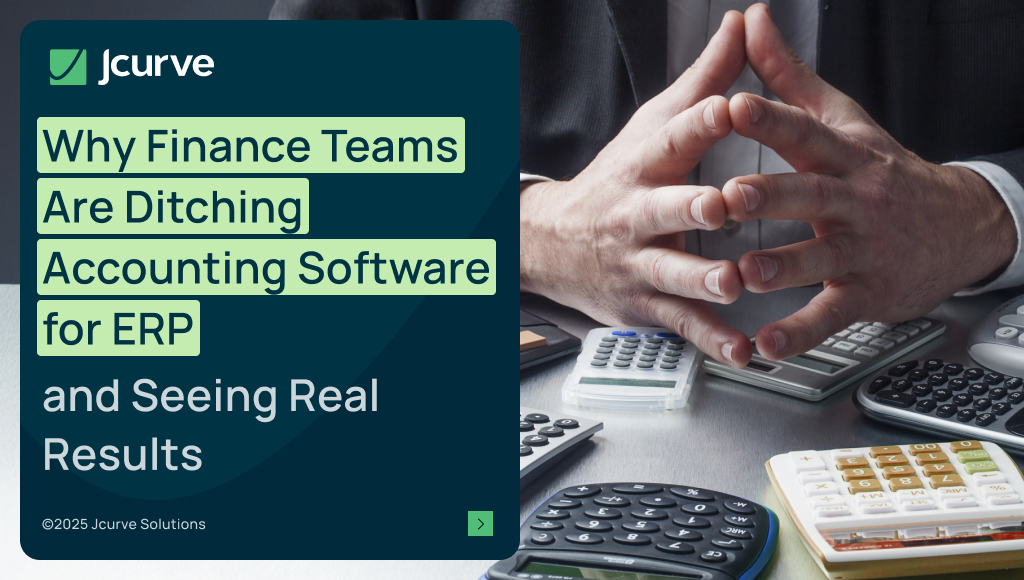
Still Closing the Books in Excel? You Deserve Better.
Here’s How ERP Changes the Game
Why Finance Teams Are Ditching Accounting Software for ERP—and Seeing Real Results
Finance professionals are under pressure like never before. Manual work, fragmented systems, and limited visibility create unnecessary roadblocks that not only slow down operations—but increase the risk of errors and compliance issues. For businesses experiencing growth or complexity, traditional accounting software simply isn’t enough.
That’s where ERP comes in.
The Daily Struggles of Finance Teams
- Manual processes are consuming your time. Reporting, reconciliations, and consolidations still live in Excel. Hours are lost to checking formulas, fixing errors, and repeating the same tasks month after month.
- Month-end feels like a mad rush. Delayed data, missing journal entries, and constant back-and-forths lead to long close cycles and mounting stress.
- There’s no real-time visibility. You’re relying on outdated reports or exporting data to analyse trends, which makes proactive decision-making difficult—if not impossible.
- Managing multi-entity operations is messy. Intercompany transactions, consolidations, and currency conversions take days and multiple systems to get right.
- Compliance is a constant concern. Whether it’s GST/VAT, local tax rules, or IFRS standards, relying on manual tracking and disconnected systems increases the risk of non-compliance
- Your systems don’t talk to each other. Finance, inventory, CRM, and payroll all operate in silos, creating duplication and blind spots.
When You’re Drowning in Manual Work, What You Need Isn’t an Upgrade—It’s a Lifeline
- Relief from reconciling the same journal entries—again.
- Relief from spending hours pulling data that should already be live.
- Relief from apologising for reports that are late (or just plain wrong).
- Relief from working across five different systems that don’t talk to each other.
- Copying and pasting across tabs → to real-time dashboards they can trust
- Chasing down numbers at midnight → to automated workflows that close the books faster
- Delayed, reactive decisions → to live financial visibility across entities and currencies
- Manual compliance checks → to audit-ready reports at the click of a button
It’s about taking the pressure off your team—so they can do the work that actually moves the business forward.
From Spreadsheet Chaos to Strategic Finance: A Client Story
- 50% improvement in inventory accuracy
- Month-end close time cut in half
- Sales and customer service teams accessing live data for faster decisions
Finance went from chasing numbers to driving the strategy.
Jcurve Solutions: Empowering Finance to Lead
At Jcurve, we’ve worked with enough overworked finance teams to know the pattern.
You’re stuck fighting fires—month-end after month-end. You’re closing late, reporting late, and always catching up. Leadership wants answers faster, but the systems and spreadsheets won’t cooperate. It’s not that your team lacks talent—it’s that they’re buried under manual work that shouldn’t exist anymore.
Need to consolidate 5 entities before lunch? Done.
Need real-time margin visibility by business unit? Easy.
Need to reduce close time by 40%? We’ve done it—many times.
Our goal?
When your systems are solid, your team gets to lead—not just survive.
Time to Stop Coping and Start Scaling
Better than upgrading existing accounting software
- Full workflow automation
- Embedded compliance and controls
- Scalable architecture
- Cross-functional insights
Don’t just survive month-end. Lead with confidence.

Jessica has a Bachelor of Arts degree from Trent University and a Masters degree from Cambridge University. He is an Adjunct Professor of Finance at Simon Fraser University’s Beedie School of Business and is both a Canadian Chartered Professional Accountant and a UK Chartered Accountant.

Jessica has a Bachelor of Arts degree from Trent University and a Masters degree from Cambridge University. He is an Adjunct Professor of Finance at Simon Fraser University’s Beedie School of Business and is both a Canadian Chartered Professional Accountant and a UK Chartered Accountant.

